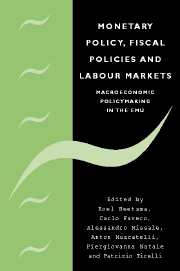Editors' introduction
Published online by Cambridge University Press: 22 September 2009
Summary
A few years after the birth of the Economic and Monetary Union (EMU) in Europe, it is still uncertain whether EMU institutions can provide sufficient macroeconomic stability and foster the reforms necessary to stimulate economic growth. The debate among economists and policymakers has focused on three key issues:
Does the Stability and Growth Pact (SGP) provide an adequate framework for the conduct of national fiscal policies or is stricter coordination of fiscal policies desirable? There are three aspects to this debate. First, whether the SGP gives national governments sufficient room for manoeuvre in stabilising domestic economies. Some economists point out that national governments still retain full discretion within the 3% deficit ceiling set in the SGP, whilst others regard the SGP as too rigid to allow for adequate stabilisation policies. As a result, suggestions to soften the SGP or discard it altogether are sometimes floated in the press. Second, whether the SGP approach, which is based on individual country fiscal discipline, will lead to uncoordinated fiscal policies which are detrimental to macroeconomic stability in Euroland. Third, whether discretionary fiscal policies may be insufficiently coordinated and inconsistent with the common monetary policy even if they are consistent with the SGP limits.
Can the ECB provide markets with adequate information about its intentions? Moreover, is the ECB reacting with sufficient competence and flexibility to a rapidly changing macroeconomic environment? The ‘two pillars strategy’ for the conduct of monetary policy, the secrecy surrounding ECB Council decisions and the apparent inertia in the decision-making process have been widely criticised. […]
- Type
- Chapter
- Information
- Monetary Policy, Fiscal Policies and Labour MarketsMacroeconomic Policymaking in the EMU, pp. 1 - 6Publisher: Cambridge University PressPrint publication year: 2004



